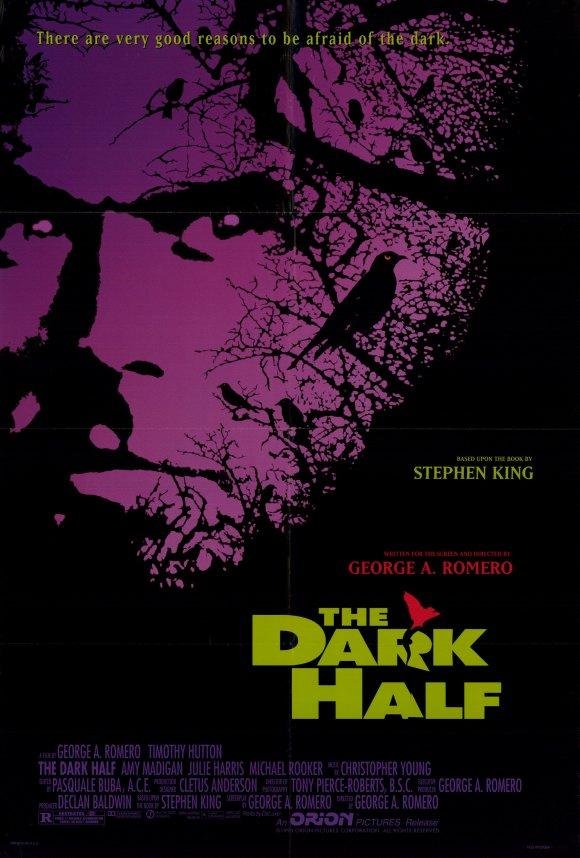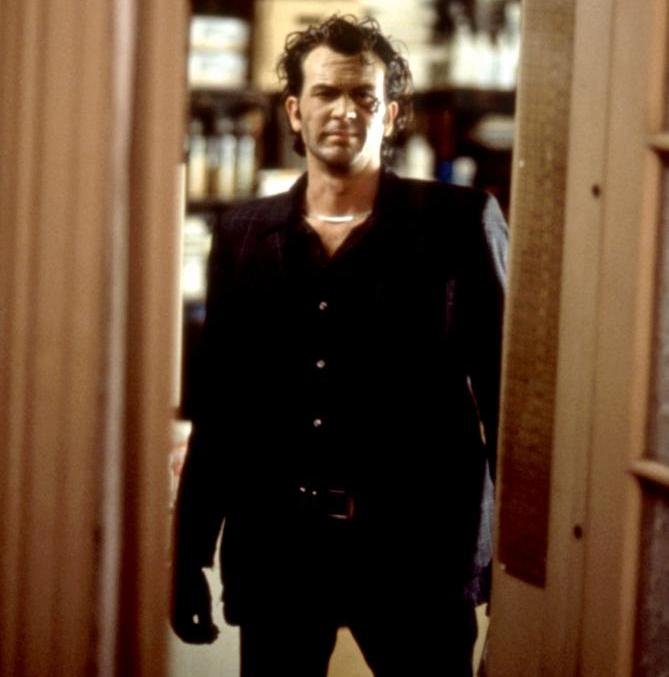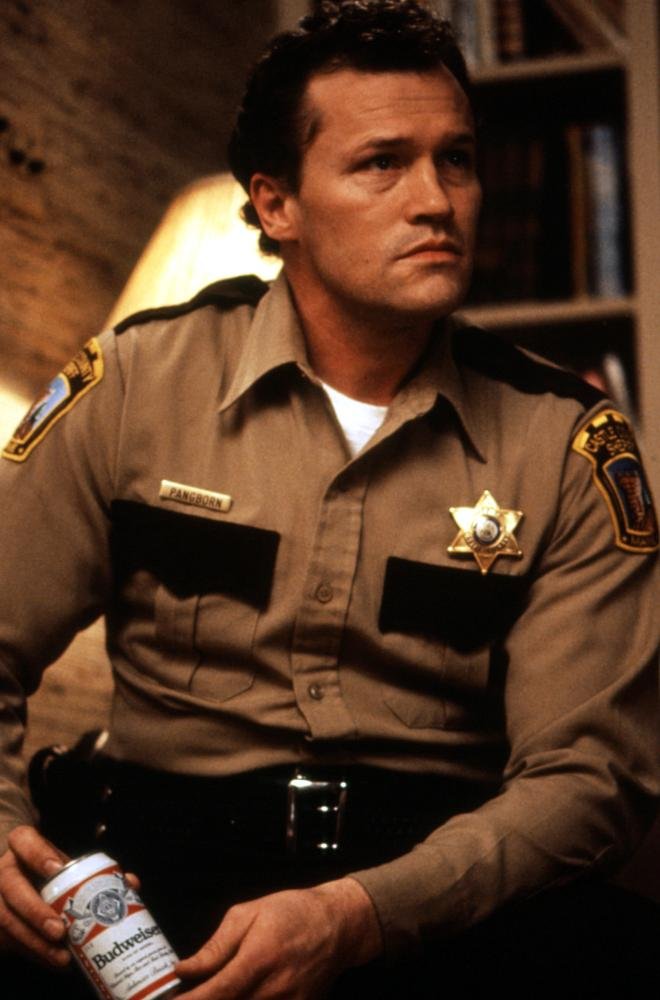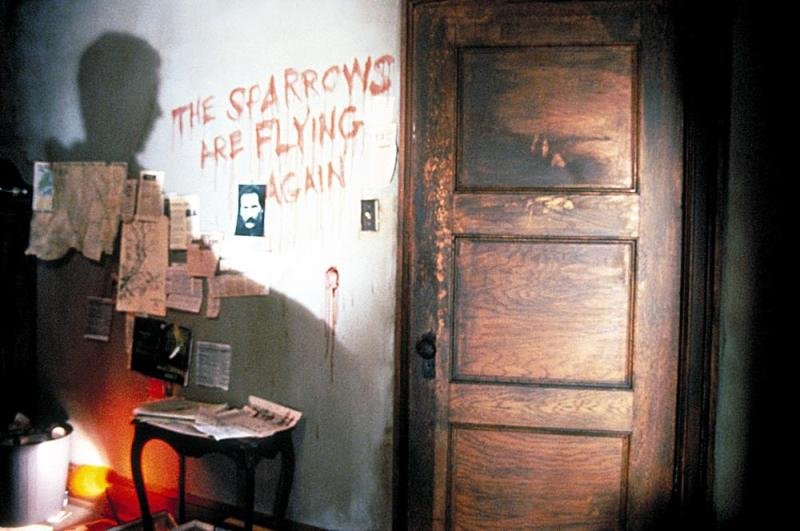THE DARK HALF: A Second Romero-Style Grab At Hollywood's Brass Ring
The Dark Half could have been George Romero's Hollywood breakthrough: it was an adaptation of a hit Stephen King novel with a healthy budget and a cast of a-list professionals. Instead, the collapse of its distributor, Orion Pictures, led to the film sitting on the shelf for over a year past its intended release. The results got a muted response from critic and viewer alike and Romero wouldn't make another feature for the rest of the decade. It's a shame because The Dark Half is a solid piece of work that showed this  indie-minded director could do worthwhile work in the Hollywood milieu.The plot of The Dark Half is a riff on the "Jekyll & Hyde" mythos, partially inspired by King's experiences writing under a pseudonym. Thad Beaumont (Timothy Hutton) is the protagonist, a professor and novelist who aspires to a mainstream literary career but keeps food on the table for his wife Liz (Amy Madigan) and kids by cranking out violent, sexy potboilers under the nom de plume "George Stark." When a would-be extortionist (Robert Joy) discovers this fact and threatens blackmail, Beaumont decides to go public with his dual identity and use it to promote his book.Unfortu
indie-minded director could do worthwhile work in the Hollywood milieu.The plot of The Dark Half is a riff on the "Jekyll & Hyde" mythos, partially inspired by King's experiences writing under a pseudonym. Thad Beaumont (Timothy Hutton) is the protagonist, a professor and novelist who aspires to a mainstream literary career but keeps food on the table for his wife Liz (Amy Madigan) and kids by cranking out violent, sexy potboilers under the nom de plume "George Stark." When a would-be extortionist (Robert Joy) discovers this fact and threatens blackmail, Beaumont decides to go public with his dual identity and use it to promote his book.Unfortu nately, Thad's alter ego does not want to rest in peace and people tied to Thad's work soon begin dying in mysterious ways. Thad's fingerprints are left at each crime scene, forcing Thad to contend with the suspicions of Sheriff Alan Pangborn (Michael Rooker) as he tries to figure out what is happening and how to stop it. The solution might lie in a childhood illness that could have to do with the present-day murder spree.The Dark Half is no cheap shock-o-rama. Romero takes a reverent approach to adapting King's work, focusing on character and a deliberately paced buildup to the horror elements. Fans of King's work will appreciate how the quirky characterizations and flavorful dialogue are kept intact. The use of Pennsylvania locations in the wintertime gives the film a distinctive visual style (Tony Pierce-Roberts' photography is gorgeous)
nately, Thad's alter ego does not want to rest in peace and people tied to Thad's work soon begin dying in mysterious ways. Thad's fingerprints are left at each crime scene, forcing Thad to contend with the suspicions of Sheriff Alan Pangborn (Michael Rooker) as he tries to figure out what is happening and how to stop it. The solution might lie in a childhood illness that could have to do with the present-day murder spree.The Dark Half is no cheap shock-o-rama. Romero takes a reverent approach to adapting King's work, focusing on character and a deliberately paced buildup to the horror elements. Fans of King's work will appreciate how the quirky characterizations and flavorful dialogue are kept intact. The use of Pennsylvania locations in the wintertime gives the film a distinctive visual style (Tony Pierce-Roberts' photography is gorgeous)  and its the rare modern Hollywood horror story that revolves around the lives of adults.However, The Dark Half doesn't shy away from the story's creep factor when it pops up. The revelation of George Stark as a flesh and blood entity has an almost Creepshow-esque vibe to it, with Hutton delivering a stylized, gleeful approach to the bete noire's brutality that offsets the placid, suburban nature of Thad Beaumont. Romero supplies an interesting combo of visual stylization and painfully realistic violence for the killings to match this story element: a stalking and killing in an empty apartment hallway is a particular standout.
and its the rare modern Hollywood horror story that revolves around the lives of adults.However, The Dark Half doesn't shy away from the story's creep factor when it pops up. The revelation of George Stark as a flesh and blood entity has an almost Creepshow-esque vibe to it, with Hutton delivering a stylized, gleeful approach to the bete noire's brutality that offsets the placid, suburban nature of Thad Beaumont. Romero supplies an interesting combo of visual stylization and painfully realistic violence for the killings to match this story element: a stalking and killing in an empty apartment hallway is a particular standout.  It's also worth noting that the finale is pretty gonzo stuff that throws in large-scale makeup and visual effects into the pot for a Hollywood-sized payoff.The big criticism that can be leveled at The Dark Half is that it is merely good when it needs to be great. Romero's stately pacing accentuates the fact that he's adapting a middling example of a King story: there are some quirky elements in the explanation of how Stark comes to be but there aren't a lot of surprises once he starts killing and the story makes Thad a passive hero for the first two thirds of the film. The horror fan won't regret taking this trip with King and Romero but they aren't likely to feel like they've seen anything fresh on the journey, either.
It's also worth noting that the finale is pretty gonzo stuff that throws in large-scale makeup and visual effects into the pot for a Hollywood-sized payoff.The big criticism that can be leveled at The Dark Half is that it is merely good when it needs to be great. Romero's stately pacing accentuates the fact that he's adapting a middling example of a King story: there are some quirky elements in the explanation of how Stark comes to be but there aren't a lot of surprises once he starts killing and the story makes Thad a passive hero for the first two thirds of the film. The horror fan won't regret taking this trip with King and Romero but they aren't likely to feel like they've seen anything fresh on the journey, either. Thankfully, the professionalism of The Dark Half keeps it afloat despite its inability to surprise. Romero's craftsmanship gives the film a rich texture and he does great work with his cast of pros: in addition to Hutton's fun dual-character performance, there's solid support from Madigan as Thad's spirited wife and Rooker as the thoughtful but determined sheriff. Fans will also appreciate Joy's gleefully nasty work in his brief role as the sleazeball blackmailer.In short, The Dark Half occupies the middle tier of Stephen King adaptations: the story is so-so stuff but the attention to craft and the faithful reproduction of King's storytelling style will entertain fans. Like Monkey Shines, it shows Romero could have a nice Hollywood section to his career if the breaks had worked out better.
Thankfully, the professionalism of The Dark Half keeps it afloat despite its inability to surprise. Romero's craftsmanship gives the film a rich texture and he does great work with his cast of pros: in addition to Hutton's fun dual-character performance, there's solid support from Madigan as Thad's spirited wife and Rooker as the thoughtful but determined sheriff. Fans will also appreciate Joy's gleefully nasty work in his brief role as the sleazeball blackmailer.In short, The Dark Half occupies the middle tier of Stephen King adaptations: the story is so-so stuff but the attention to craft and the faithful reproduction of King's storytelling style will entertain fans. Like Monkey Shines, it shows Romero could have a nice Hollywood section to his career if the breaks had worked out better.


